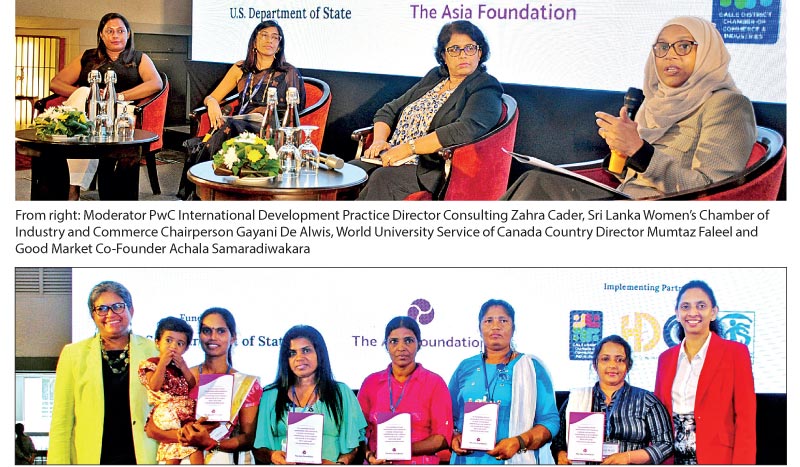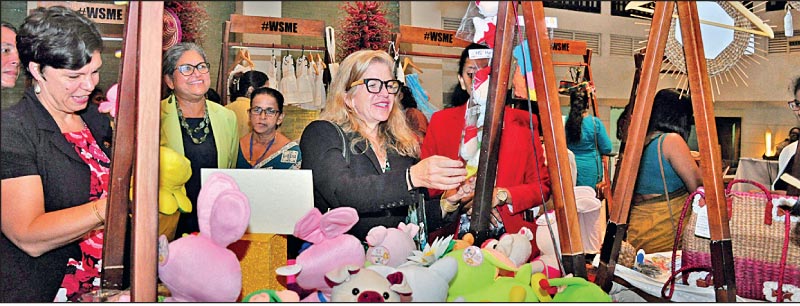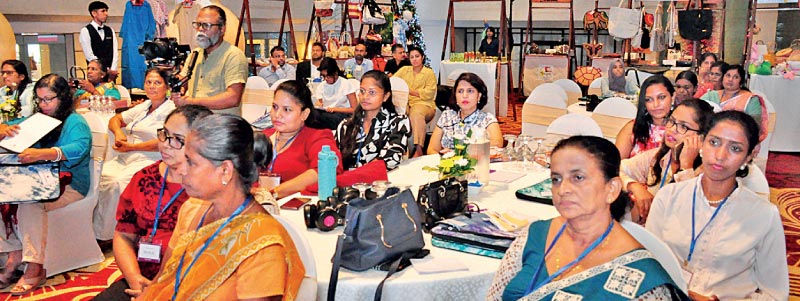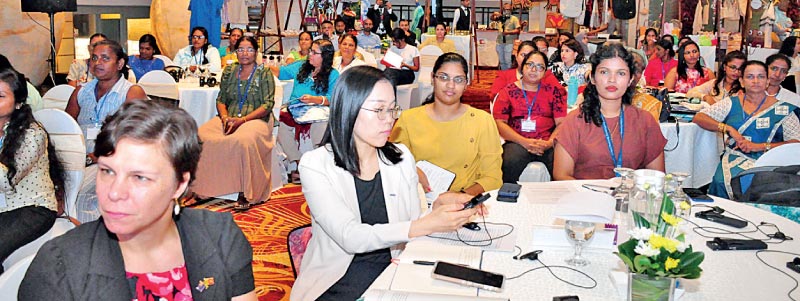Monday Feb 23, 2026
Monday Feb 23, 2026
Friday, 13 December 2024 02:40 - - {{hitsCtrl.values.hits}}


By Janani Kandaramage
Sponsored by the US Department of State, The Asia Foundation (TAF) on Monday hosted an event to celebrate the culmination of a three-year flagship initiative aimed at empowering female entrepreneurs in the Northern and Southern Provinces.
Themed ‘Improving the Economic Wellbeing of Vulnerable and Marginalised Women,’ the project focused on enhancing the economic wellbeing of 300 vulnerable and marginalised women during the series of economic, health, and political crises by strengthening the participation of women in the startup sector as micro and small business (MSB) owners.
In partnership with the Hambantota District Chamber of Commerce (HDCC), Galle District Chamber of Commerce and Industries (GDCCI) and Jaffna Social Action Centre (JSAC), TAF worked with five districts – Jaffna, Mullaitivu, Kilinochchi, and Galle – to boost female representation in business ownership by developing technical expertise, facilitating their adaptation to evolving market dynamics, offering financial assistance, and providing mentoring and networking opportunities.
Through a series of extensive training workshops, personalised mentoring sessions, and a greater reach in the country as a result of participation in trade fairs, the program significantly leveraged their entrepreneurial capabilities. Key elements of the training included entrepreneurship, financial literacy, and digital marketing-equipping the beneficiaries with the vital skills to improve operational efficiency, gain market competitiveness, and ensure long-term sustainability. In addition to training, over 100 beneficiaries received grants to foster innovation and expansion, with a focus on digital competency development.
Providing financial grants to women-owned MSBs helped address barriers to financial resources often faced by women, particularly those experiencing discrimination. Access to financial resources in the form of seed grants to and digital skills development grants was especially crucial post COVID-19, as it enabled product development, innovation, market entry and diversification, and income generation. This support, in addition to greater social capital due to mentorship and networking programs, also boosted the confidence and motivation of women entrepreneurs, empowering them to navigate challenges and seize new opportunities.
Impact on Sri Lankan economy
Reiterating the far-reaching benefits of the project and expressing hope for the future, TAF Sri Lanka Country Representative Dinesha desilva Wickramanayake said: “By building capacity, agency, and leadership among women MSB owners, the program not only supports individual business growth but also contributes to broader goals of gender equality and rural economic development in Sri Lanka. These efforts underscore the critical role of targeted support in not only bridging market access gaps and catalysing sustainable economic empowerment for women in underrepresented regions, but also enhancing the overall wellbeing of the economy as household incomes are raised with more women earning.”
She also reinforced the integration of mental health awareness campaigns within the workshops, providing stress management tools and fostering resilience that will aid women in mentally overcoming any hurdles they face in the business sector, ensuring their retainment in the entrepreneurship field. She believes that this trailblazing step taken by TAF in Sri Lanka will have ripple effects across the community, building women ready to lead, inspire and succeed.
TAF Asia Policy Lead and Senior Program Manager Rukshanie Vidyaratne remarked on the tumultuous yet inspiring journey of these female entrepreneurs. “Initially, many of these young women started small, supplying their products to other shops. Today, they have grown remarkably, opening their own stores and becoming employers to multiple staff members. This growth has notably increased job opportunities for women in these communities. In addition to expanding their businesses, many owners have taken charge of their branding efforts, creating unique logos, business cards, and professional packaging for their products. Furthermore, they have successfully connected with mainstream markets, securing better value and consistent demand for their offerings.”
Risk taking and resilience
Highlighting the project achievements and milestones, Vidyaratne emphasised that this program was directed towards victims of war, widows, survivors of gender-based violence, LGBTQ+ communities, women with disabilities, and those affected by caste considerations. She believes that these women in particular must be targeted because their economic state and the deeply entrenched social and cultural norms within their households hinder their access to opportunities, making entrepreneurship a necessary pathway to their financial independence. Elaborating on its process, she said: “90 from each district were chosen. We received 110 women from Mullaitivu, but we had to shortlist only 34. Nevertheless, this demonstrates the significant progress the nation is making.”
“Our strategies included bridging the language barriers between various communities, as it is essential to ensure that communication gaps do not prevent women from accessing knowledge and expressing their ideas. We would like to thank all our partners including University of Ruhuna, University of Vavuniya, and Lanka Angel Network for their unwavering commitment to translation techniques. Furthermore, our 30 seed grants to six beneficiaries from each district and 72 digital marketing grants underscore the necessity of financial assistance in empowerment, while the six-month advisory sessions conducted equipped them with the skills required. In addition to these groundbreakers learning from us, we have also learned several lessons from them, including flexibility, collaboration, adaptive programming and requirement assessments,” she opined.
Keynote speaker Counsellor for Public Affairs Heidi Hattenbach expressed awe over this initiative, by highlighting its potential in challenging corruption by building businesses rooted in trust and transparency. She also stressed on the creation of gender equality at all levels in the economic sector as more women join the workforce due to the growth of female-oriented businesses that offer employment. “The Asia Foundation’s efforts despite the forex crisis, political instability, power cuts, and hyperinflation persevered to ensure financial inclusion regardless of age, gender, and economic status. By equipping women of all ethnicities and backgrounds with the know-how, you are carving a better future not only for them but the country as a whole, showing us possibility in the face of impossibility.”
Access to capital
The panel discussion held soon after, moderated by Zahra Cader spotlighted how although women comprised 52% of the Sri Lankan population, only 32% are involved in the local labour force and even less in entrepreneurship. She acknowledged that while female literacy rates, and access and participation in healthcare were relatively stabilised, the country was lacking in female political and economic participation. In Sri Lanka, empowering women to actively contribute across sectors could add $ 20 billion to the country’s GDP. On a global scale, closing the gender earnings gap and increasing female participation in the workforce could generate an astounding $ 28 trillion in additional GDP.
Speaking about the challenges encountering women who seek work opportunities, Achala Samaradiwakara noted that access to capital was a key obstacle to female startups. Globally, women are 20% less likely to get finance compared to men, and in Sri Lanka, only 10% of women have adequate access to adequate financing. She also emphasised that while female literacy rates are high in this country, financial literacy is severely lacking. Women must be increasingly enlightened to alternative sources of start-up capital and effective legal mechanisms must be put in place and monitored to prevent gender discrimination when seeking loans from financial institutions.
Digital literacy and cultural prejudices
Other challenges that were pointed out was the digital divide, with only 17% of rural women accessing smartphones and computers. World University Service of Canada Country Director Mumtaz Faleel expressed hope in the current administration’s efforts toward greater economic digitalisation, fostering female empowerment by enhanced access to online education, remote work opportunities and exposure to international entrepreneurship platforms. Faleel also noted that the availability of mentorship and peer networks to women were significantly less when compared to their male counterparts.
To solve this imbalance, she recommended the need for matching the skills of these women to market conditions, and spreading technical expertise evenly in all regions’ ensuring knowledge is not just concentrated in Colombo. Tailored training on technologies, coupled with detailed curation processes identifying strengths, weaknesses, opportunities and threats facing these budding female entrepreneurs can eventually mobilise them as a company
Sri Lanka Women’s Chamber of Industry and Commerce Chairperson Gayani De Alwis spoke about the gender biases and ingrained societal values hindering women. She expressed how society stereotypes men as the ‘breadwinners’ and women as ‘homemakers’ and ‘çhildbearers’ perpetuating misconceptions surrounding a woman’s capabilities, limiting her from engaging in work and further personal growth.
In response to legal and political frameworks that can challenge such false perceptions, De Alwis suggested increased social marketing campaigns aimed at raising awareness, in addition to revisions in the local education system that teaches people to respect all regardless of gender, racial or any differences. Being educated on these pressing concerns from a young age is fundamental in establishing a new value system based on mutual respect and opportunity to all.
The Asia Foundation is a non-profit international development organisation committed to elevating livelihoods and expanding opportunities across Asia and the Pacific. Informed by 70 years of experience and deep local knowledge, their work revolves around governance, climate action, gender equality, education and leadership, inclusive growth, and international cooperation. They work in more than 20 countries through their 17 permanent country offices and programs across Asia and the Pacific, supported by a headquarters in San Francisco and an office in Washington DC.
Their funding comes from a wide array of bilateral and multilateral development agencies, foundations, corporations, and individuals. The organisation will soon commence phase 2 titled, ‘Becoming export ready’ which aims to facilitate greater dialogue with policymakers over these projects, while enabling market opportunities for these women on a global sphere.
Pix by Lasantha Kumara


